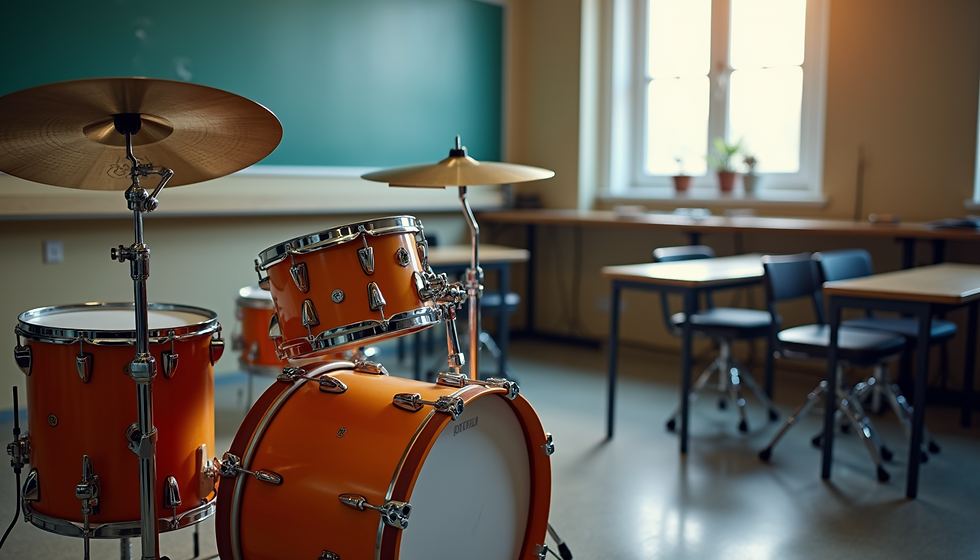Contemporary Music Education: Adapting to Modern Needs
- Steven Sammut

- Sep 4
- 4 min read
Music education is evolving rapidly to meet the demands of today’s learners. With changing tastes, technology, and lifestyles, modern music learning must be flexible, engaging, and accessible. Schools and parents alike seek solutions that inspire young musicians while fitting into busy schedules and diverse environments. This blog explores how contemporary music education is transforming to serve these needs, offering practical insights and actionable advice for anyone involved in nurturing musical talent.
Embracing Modern Music Learning in Schools and Homes
Modern music learning is no longer confined to traditional instruments or rigid lesson plans. It embraces a variety of styles, instruments, and teaching methods that resonate with today’s youth. Schools face challenges such as limited music provision, lack of specialist teachers, and complex administration. Parents often struggle to find local tutors or need flexible options that fit their child’s busy life.
To address these challenges, a professional, fully managed service is essential. Such services provide:
Qualified, DBS-checked tutors who specialise in contemporary instruments like guitar, drums, keyboard, piano, and singing.
Flexible lesson delivery options including in-school, online, or hybrid formats.
Streamlined administration handling tuition schedules, billing, and exam arrangements.
Accredited exams such as Trinity Rock & Pop, giving pupils recognised qualifications and confidence.
This approach ensures that music lessons are not only fun and inspiring but also reliable and results-driven. Schools can enrich their curriculum and extracurricular offerings without the logistical headaches, while parents enjoy peace of mind knowing their children are learning safely and effectively.
What is the Concept of Contemporary Music?
Contemporary music refers to the styles and genres that are popular and relevant today, including rock, pop, electronic, and urban music. Unlike classical music education, which focuses on traditional repertoire and techniques, contemporary music learning encourages creativity, improvisation, and personal expression.
Key features of contemporary music include:
Use of modern instruments and technology such as electric guitars, synthesizers, and digital audio workstations.
Focus on popular music styles that students relate to and enjoy.
Performance and songwriting skills alongside technical proficiency.
Collaborative learning environments where students can form bands or ensembles.
This concept aligns perfectly with the interests of young learners, making music education more engaging and meaningful. It also prepares students for real-world music experiences, whether as hobbyists or aspiring professionals.

How Contemporary Music Education Supports Academic and Personal Growth
Music lessons offer more than just musical skills. They contribute significantly to a child’s overall development. Research shows that learning music can:
Boost academic performance - Enhancing memory, attention, and problem-solving skills.
Improve social skills - Encouraging teamwork, communication, and confidence.
Foster emotional expression - Providing a healthy outlet for feelings and creativity.
Develop discipline and perseverance - Through regular practice and goal-setting.
Schools that integrate contemporary music education into their curriculum see increased pupil engagement and motivation. Parents notice positive changes in their children’s attitude towards learning and self-esteem. The combination of fun, modern lessons with structured progress tracking through accredited exams creates a powerful learning experience.
For example, a school in Southeast England reported a 30% increase in music participation after partnering with us as a contemporary music education provider. Pupils were excited to learn instruments they loved, and teachers appreciated the professional support and resources.

Practical Tips for Schools and Parents to Maximise Music Learning
To get the most out of modern music learning, consider these actionable recommendations:
For Schools:
Partner with specialist providers who offer fully managed services, including tutor recruitment, scheduling, and exam administration.
Promote music lessons actively through assemblies, newsletters, and parent evenings to boost enrolment.
Incorporate contemporary music styles into the curriculum to engage a wider range of pupils.
Use technology such as online lesson platforms to offer flexible learning options.
Celebrate achievements with performances and exam certificates to motivate students.
For Parents:
Choose DBS-checked tutors with proven experience in contemporary music education.
Opt for flexible lesson formats that fit your family’s schedule, whether in-school, online, or at home.
Encourage regular practice by setting up a dedicated space and time for music.
Attend performances and recitals to support your child’s progress and confidence.
Discuss goals and preferences with tutors to tailor lessons to your child’s interests.
By following these tips, both schools and parents can create a supportive environment that nurtures musical talent and fosters lifelong appreciation for music.
Inspiring the Next Generation Through Contemporary Music Education
The future of music education lies in its ability to adapt and inspire. With over 70,000 students taught since 1995, providers like the Rock & Pop Foundation have demonstrated the power of a modern, engaging approach. Their fully DBS-checked tutors and Trinity Rock & Pop accredited exams ensure quality and trustworthiness.
Whether it’s a child picking up the guitar for the first time or a school expanding its extracurricular offerings, contemporary music education offers a pathway to creativity, confidence, and achievement. By embracing this approach, schools and parents can unlock the full potential of young musicians and enrich their lives through the joy of music.
For more information on how to bring contemporary music education into your school or home, visit the Rock & Pop Foundation.
This evolving landscape of modern music learning is not just about teaching notes and rhythms. It’s about creating experiences that resonate with today’s youth, building skills that last a lifetime, and fostering a community where music thrives. Start your musical journey today and see the difference it can make.






Comments